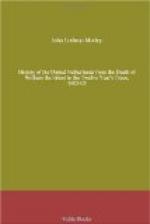“You order the ban to be executed against our children and our children’s children, but your Highness never learned this in the Bible, when you were an archbishop, and when you expounded, or ought to have expounded, the Holy Scriptures to your flock. What theology teaches your Highness to vent your wrath upon the innocent?
“Whenever the cause of discontent is taken away, the soldiers will become obedient and cheerful. All kings and princes may mirror themselves in the bad government of your Highness, and may see how they fare who try to carry on a war, while with their own hands they cut the sinews of war. The great leaders of old—Cyrus, Alexander, Scipio, Caesar—were accustomed, not to starve, but to enrich their soldiers. What did Alexander, when in an arid desert they brought, him a helmet full of water? He threw it on the sand, saying that there was only enough for him, but not enough for his army.
“Your Highnesses have set ten crowns, and one hundred, and five hundred crowns upon our heads, but never could find five hundred mites nor ten mites to keep our souls and bodies together.
“Yet you have found means to live yourselves with pomp and luxury, far exceeding that of the great Emperor Charles and much surpassing the magnificence of your Highnesses’ brothers, the emperor and the king.”
Thus, and much more, the magistrates of the “Italian republic”—answering their master’s denunciations of vengeance, both in this world and the next, with a humorous scorn very refreshing in that age of the world to contemplate. The expanding influence of the Dutch commonwealth was already making itself felt even in the ranks of its most determined foes.
The mutineers had also made an agreement with the States-General, by which they had secured permission, in case of need, to retire within the territory of the republic.
Maurice had written to them from his camp before Grave, and at first they were disposed to treat him with as little courtesy as they had shown the Nuncius; for they put the prince’s letter on a staff, and fired at it as a mark, assuring the trumpeter who brought it that they would serve him in the same manner should he venture thither again. Very soon afterwards, however, the Eletto and council, reproving the folly of their subordinates, opened negotiations with the stadholder, who, with the consent of the States, gave them preliminary permission to take refuge under the guns of Bergenop-Zoom, should they by chance be hard pressed.




